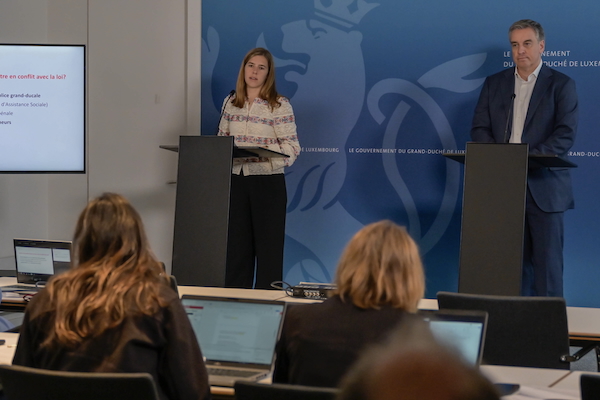 (L-R) Elisabeth Margue, Luxembourg’s Minister of Justice; Claude Meisch, Luxembourg’s Minister of Education, Children and Youth;
Credit: MJUST
(L-R) Elisabeth Margue, Luxembourg’s Minister of Justice; Claude Meisch, Luxembourg’s Minister of Education, Children and Youth;
Credit: MJUST
On Tuesday 20 May 2025, Luxembourg’s Minister of Education, Children and Youth, Claude Meisch, and Minister of Justice, Elisabeth Margue, presented government amendments to draft laws concerning juvenile criminal law, the rights of minor victims and witnesses within criminal proceedings.
Luxembourg’s Ministry of Justice and the Ministry of Education, Children and Youth reported that amendments drafted in relation to laws 7991, 7992 and 7994, which address the introduction of juvenile criminal law, the rights of minor victims and witnesses within criminal proceedings and the assistance, support and protection of minors, young people and families, enhance the legislative proposals first tabled in 2022, while preserving their original aims and principles.
Draft laws 7991 and 7994 distinguish between measures aimed at minors accused of committing criminal offences and those intended for minors requiring assistance, support or protection. This distinction aligns with recommendations from the UN Committee on the Rights of the Child. Draft law 7992 strengthens the rights of minors who are victims or witnesses of criminal offences.
Minister Meisch stated: "Separating youth protection from juvenile criminal law lies at the heart of this reform. It represents a real paradigm shift, offering children and families more coherent and better-adapted protection that is firmly rooted in children’s rights."
Minister Margue emphasised that preventing juvenile delinquency remains a government priority. The reform promotes accountability among minors while reinforcing their procedural rights. She added: "Introducing juvenile criminal law is a significant step forward for Luxembourg and aligns with our international obligations on children's rights. The reform ensures minors understand their actions and their impact on others. It focuses on education and reintegration measures to prevent reoffending. Through this approach, Luxembourg aims to improve its effectiveness in tackling youth crime."
The ministries also reported that the National Office for Children (ONE) will strengthen its role in prevention, supporting parents from the first signs of difficulty. Voluntary measures, carried out in partnership with families, will take priority and judicial intervention will only occur when voluntary measures cannot serve the child's best interests.
The ministries also noted that retaining parental authority within the child’s family will become the standard and that the proposed law will allow certain responsibilities to be delegated to service providers if they are for the benefit of the child. If necessary, youth judges may temporarily suspend parental authority when required by the child’s welfare. The reform also enshrines the right of children, young adults and their families to participate in all decisions that affect them, whether under voluntary or judicial measures.
The reported key changes to Draft Law 7994 are:
⁃ harmonised information sharing: information sharing between professionals, including the public prosecutor, has been aligned with the other two reform-related bills: the juvenile criminal law and rights of minor victims and witnesses;
⁃ transfer of information gathering responsibilities: the responsibility for gathering and handling safeguarding concerns will transfer from a specialist unit to the ONE, which will assess any risks to the minor's health, safety or development;
⁃ clarified funding procedures: the law now clearly defines how measures will be funded in both voluntary and judicial contexts;
⁃ enhanced personal data protection: in line with the new Constitution and GDPR, specific provisions will improve the protection of personal data.
The introduction of Juvenile Criminal Law initiates:
⁃ accountability of minors in conflict with the law: draft law 7991 creates procedures tailored to minors aged thirteen and above. It aims to ensure minors understand the seriousness of their actions and consequences. The main goal remains rehabilitation, with imprisonment as a last resort. The law gives prominence to alternatives, such as educational service or therapeutic follow-up, especially when minors admit to offences and cooperate.
The creation of Juvenile Criminal Courts initiates:
⁃ a dedicated juvenile criminal court which will manage cases involving minors. Specially trained magistrates will exclusively handle such cases. The Central Social Assistance Service (SCAS) will focus solely on minors in conflict with the law and will monitor alternatives to penal sanctions.
The introduction of Procedural Safeguards for Minors ensures:
⁃ minors will benefit from reinforced procedural safeguards, including accompaniment by legal guardians or another appropriate adult. Authorities must keep minors informed throughout their legal proceedings.
The strengthening of safeguards for minor victims or witnesses:
⁃ draft law 7992 is said to improve the rights and procedural protections of minors who are victims or witnesses of crime. Measures include continuous support from professionals and a trusted person of the child’s choice during proceedings. Victims and witnesses will receive updates on case progress, including offender release if the latter is serving a prison sentence.
The reported key amendments to Draft Laws 7991 and 7992 are:
⁃ the option to apply juvenile criminal law to young adults aged eighteen to 21 has been removed due to legal uncertainties;
⁃ additional alternatives to penal sanctions, such as contact bans with victims or co-offenders;
⁃ broader access to information for minors;
⁃ authorities may open an investigation, even for minors under the age of thirteen, to allow victims to seek redress;
⁃ enhanced and clarified information sharing between ONE and SCAS has been aligned with draft law 7994.








